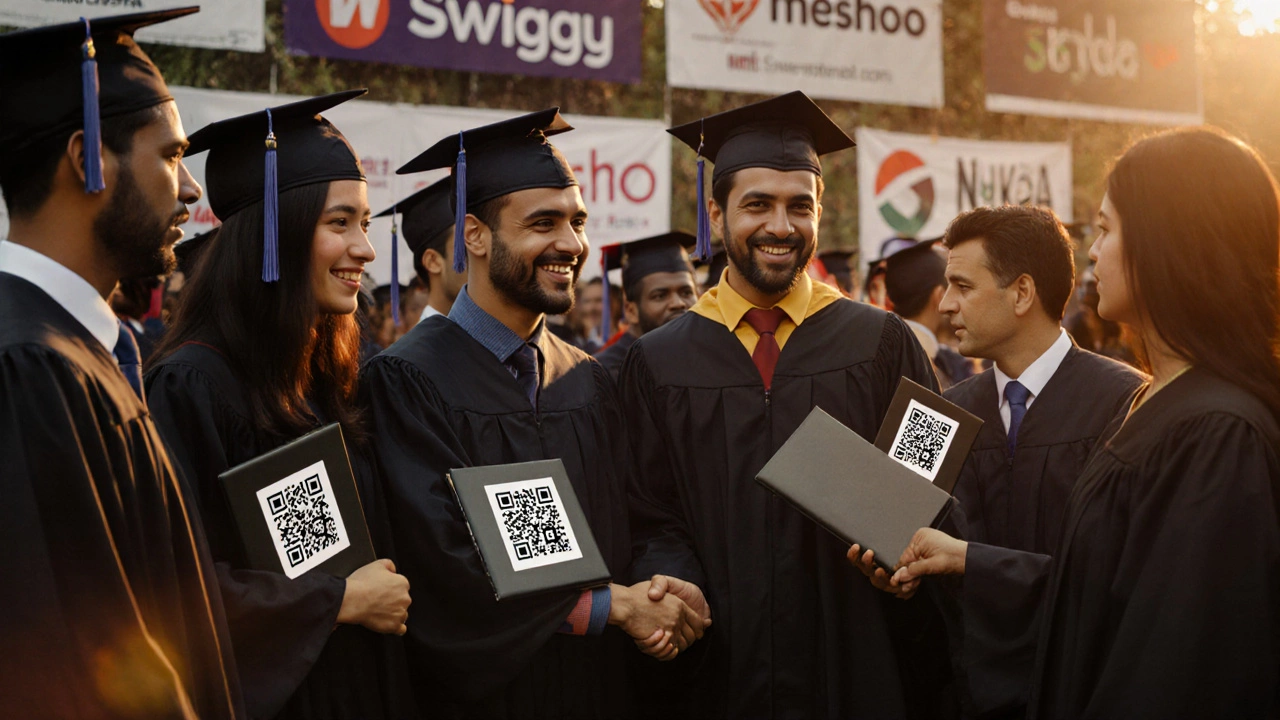MBA in Digital Marketing ROI Calculator
Your Current Situation
Program Details
More than 120 universities and business schools in India now offer some form of MBA in digital marketing. But not all of them are the same. If you're wondering whether an MBA in digital marketing is worth your time and money, the answer isn't just yes or no-it depends on what you want to do next.
What an MBA in Digital Marketing Actually Covers
An MBA in digital marketing isn’t just about learning how to run Facebook ads or post on Instagram. It’s a full business degree with a focus on how digital tools change how companies attract customers, measure success, and grow revenue. You’ll study core business subjects like finance, strategy, and leadership-but every case study, project, and exam ties back to digital channels.
For example, instead of analyzing how Coca-Cola distributed soda in the 90s, you’ll look at how Nykaa scaled its beauty brand using influencer marketing and data-driven retargeting. You’ll learn how to use Google Analytics 4 to track customer journeys, not just clicks. You’ll build campaigns using CRM tools like HubSpot and Salesforce, and you’ll learn how to justify marketing spend to CFOs using ROI models, not gut feelings.
Top programs in India-like those at NMIMS, Symbiosis, and XLRI-mix theory with live projects. Students have worked with startups like Meesho and BigBasket to redesign their email funnels or optimize their Google Shopping feeds. That kind of hands-on experience is what employers look for.
Who Should Consider This Degree?
If you’re already working in marketing and feel stuck in a tactical role-running ads, scheduling posts, managing influencers-an MBA can help you move into strategy, leadership, or even product marketing. Many graduates end up as digital marketing managers, heads of growth, or customer acquisition leads at companies like Swiggy, Ola, or Zomato.
If you’re coming from a non-marketing background-say, engineering, finance, or even hospitality-an MBA in digital marketing gives you a clear path into tech-driven business roles. You don’t need to know how to code, but you do need to understand how data shapes decisions. The best programs teach you how to speak the language of both marketers and engineers.
There’s also a growing group of entrepreneurs. More than 40% of digital marketing MBA graduates in India start their own agencies or consultancies within two years. They don’t just know how to run ads-they know how to build systems, hire teams, and sell services to clients.
Online vs. Full-Time: What’s the Difference?
You’ll find two main types of programs: full-time, on-campus MBAs and part-time or online MBAs. Both have their place, but they serve different people.
Full-time programs (like the one at IIM Lucknow or MDI Gurgaon) are intense. They last two years, include internships, and often come with campus placements. You’ll build a network with classmates who’ll become your future colleagues. But you’ll need to quit your job, and tuition can hit ₹15-20 lakhs.
Online MBAs (from institutions like Amity, Manipal, or upGrad) are designed for working professionals. You study in the evenings or on weekends. Tuition is lower-usually ₹3-8 lakhs-and you keep your salary. But you won’t get the same access to recruiters or campus events. Some employers still prefer traditional degrees, especially in older industries like banking or manufacturing.
Here’s the catch: LinkedIn data from 2024 shows that 68% of hiring managers in India don’t care if the MBA was online or in-person-as long as the candidate can show results. If you can prove you ran a campaign that boosted conversions by 35% or cut customer acquisition cost by 22%, your degree type matters less than your track record.

What You’ll Learn: Core Modules Breakdown
Most MBA programs in digital marketing follow a similar structure. Here’s what you can expect:
- Digital Strategy & Planning: How to align marketing goals with business goals. You’ll learn frameworks like AARRR (Acquisition, Activation, Retention, Referral, Revenue) and how to map them to real campaigns.
- Search Engine Marketing (SEM) & SEO: Not just keyword research. You’ll learn how to structure landing pages for conversion, analyze competitor backlink profiles, and use tools like SEMrush and Ahrefs.
- Social Media Marketing: Beyond posting. You’ll study algorithm changes on Instagram and TikTok, build community engagement models, and measure brand sentiment using AI tools.
- Data Analytics & Marketing Automation: You’ll work with Google Looker Studio, Tableau, and platforms like Marketo. You’ll learn how to turn raw data into actionable insights.
- Consumer Behavior in Digital Spaces: Why do people click? Why do they abandon carts? You’ll study behavioral economics and neuromarketing techniques used by companies like Amazon and Flipkart.
- Content Marketing & Storytelling: How to create content that doesn’t just get views but drives sales. You’ll write email sequences, script YouTube videos, and design lead magnets.
- Legal & Ethical Issues: GDPR, India’s DPDP Act, influencer disclosure rules, and ad transparency laws. You’ll learn what you can and can’t do legally.
Some programs even offer electives in AI in marketing, e-commerce logistics, or B2B SaaS growth. The best ones let you choose a specialization-like performance marketing, brand building, or analytics.
Cost vs. Return: Is It Worth It?
Let’s talk numbers. A full-time MBA at a top Indian institute costs ₹15-20 lakhs. An online MBA runs ₹3-8 lakhs. What do you get back?
According to a 2025 survey by NASSCOM and the Indian Marketing Association, graduates with an MBA in digital marketing earn:
- ₹8-12 lakhs/year as freshers (up from ₹5-7 lakhs in 2020)
- ₹18-25 lakhs/year after 3-5 years of experience
- ₹30+ lakhs/year in leadership roles at tech companies or global agencies
Compare that to someone with just a bachelor’s degree and a few certifications: they might earn ₹6-8 lakhs as a digital executive, but hit a ceiling at ₹12-15 lakhs without formal leadership training.
And it’s not just salary. Many graduates say the biggest return is access. They get invited to industry events, meet VPs at top firms, and land referrals they never would have found on LinkedIn alone.
What Employers Really Want
Here’s the truth: companies aren’t hiring you because you have an MBA. They’re hiring you because you can prove you know how to grow revenue.
At Razorpay, a hiring manager told me: “We don’t care if you went to IIM or did an online course. We care if you can show us a campaign you ran that increased sign-ups by 40% in 90 days. If you can explain how you tested it, what failed, and how you fixed it-that’s what gets you the job.”
That’s why top programs now require students to build a portfolio. It’s not just a resume. It’s a live dashboard showing real campaigns, metrics, and results. Some even host demo days where students pitch their projects to real companies.

Alternatives to an MBA
Is an MBA the only way? No. There are strong alternatives:
- Certifications: Google Skillshop, Meta Blueprint, HubSpot Academy, and Coursera’s Digital Marketing Specialization. These are cheaper and faster-but they don’t give you leadership training.
- Bootcamps: Programs like upGrad’s Digital Marketing Bootcamp or Simplilearn’s PG Program. These are intense, 6-12 month courses with placement support. They’re great for career switchers.
- Self-learning + real projects: Build your own e-commerce store, run ads for a local business, or manage a blog. Track everything. Document your results. This can be just as powerful-if you’re disciplined.
But here’s the difference: certifications teach you tools. An MBA teaches you how to lead teams, manage budgets, and make strategic calls under pressure. If you want to be a manager, not just a specialist, the MBA still has the edge.
How to Choose the Right Program
Not all MBAs are created equal. Here’s what to look for:
- Industry connections: Does the school have tie-ups with companies like Adobe, Google, or PhonePe? Do they bring in guest lecturers from real marketing teams?
- Placement data: Ask for the last 3 years’ placement reports. Look for average salary, companies hiring, and roles offered. Avoid schools that only list “marketing roles” without specifics.
- Faculty: Are professors still working in the industry? Or are they academics who haven’t touched a Google Ads account since 2018?
- Projects: Do students work on live briefs? Or just case studies from textbooks?
- Alumni network: Search LinkedIn for graduates. Are they working at companies you admire? Do they have titles like “Head of Growth” or “Digital Strategy Lead”?
One red flag: programs that promise “100% placement” or “guaranteed job in 30 days.” That’s marketing hype. Real results take time, effort, and skill.
Final Verdict: Should You Do It?
If you want to move beyond executing tasks and start leading teams, shaping strategy, and making budget decisions-then yes, an MBA in digital marketing is one of the fastest paths forward in India’s digital economy.
If you’re happy doing ads, managing social media, and don’t care about climbing the ladder-then skip it. Save your money and invest in certifications and real-world projects instead.
The digital marketing landscape changes fast. But the people who rise to the top aren’t just the ones who know the latest tool. They’re the ones who understand business, lead teams, and can prove they drive results. An MBA gives you the credibility and skills to be one of them.
Is an MBA in digital marketing recognized in India?
Yes, MBA programs in digital marketing are fully recognized by the University Grants Commission (UGC) and the All India Council for Technical Education (AICTE) if offered by accredited institutions. Top schools like IIMs, NMIMS, and Symbiosis have strong industry recognition. Employers in tech, e-commerce, and agencies actively recruit from these programs.
Can I do an MBA in digital marketing without a business background?
Absolutely. Many students enter these programs from engineering, arts, science, or even hospitality backgrounds. The curriculum is designed to bring everyone up to speed. You’ll learn business fundamentals alongside digital skills. What matters most is your curiosity, willingness to learn data, and ability to think strategically.
What’s the difference between an MBA in digital marketing and a PGDM in digital marketing?
An MBA is awarded by universities and follows UGC guidelines. A PGDM (Post Graduate Diploma in Management) is offered by autonomous institutes like IIMs and XLRI. PGDMs are often more industry-focused and updated faster. Both are respected, but PGDMs tend to have stronger industry ties and higher placement rates. For most employers, the distinction doesn’t matter-what matters is the school’s reputation and your skills.
How long does it take to complete an MBA in digital marketing?
Full-time programs take two years. Part-time or online MBAs usually take 2-3 years, depending on your pace. Some intensive programs, especially bootcamp-style ones, can be completed in 12-18 months. Always check the structure before enrolling.
Can I work while doing an online MBA in digital marketing?
Yes, that’s the whole point of online MBAs. Most are designed for working professionals. Classes are recorded, assignments are flexible, and deadlines are spaced out. You can keep your job, earn while you learn, and apply what you study directly to your work.
Do I need to take CAT or MAT to get into an MBA in digital marketing?
For top-tier institutes like IIMs, NMIMS, or XLRI, yes-you’ll need to take CAT, XAT, or MAT. But many private and online universities accept other criteria: work experience, academic scores, personal interviews, or their own entrance tests. Always check the admission requirements of the specific program you’re interested in.
What jobs can I get after an MBA in digital marketing?
Graduates land roles like Digital Marketing Manager, Growth Marketing Lead, SEO/SEM Head, E-commerce Strategy Manager, Brand Manager (Digital), Customer Acquisition Specialist, and Marketing Analyst. Many also start their own agencies or join startups as early marketing hires. The demand is highest in e-commerce, fintech, SaaS, and digital media companies.
Is digital marketing a good career in India in 2025?
Yes. India’s digital economy is projected to hit $1 trillion by 2030. Every business-from local kiranas to global brands-is investing in online growth. There’s a shortage of skilled leaders who can bridge marketing and technology. If you combine technical skills with business acumen, you’ll have more opportunities than you can handle.

